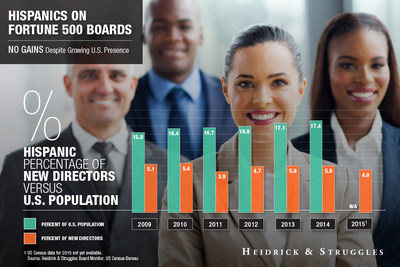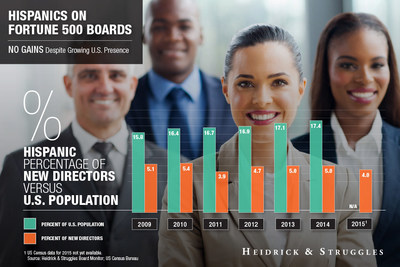Site Search
Insights
CHICAGO, May 16, 2016 /PRNewswire/ -- Research conducted by Heidrick & Struggles (Nasdaq: HSII), a premier provider of executive search, leadership consulting and culture shaping worldwide, highlights the persistent underrepresentation of Hispanic directors appointed to boardrooms within the Fortune 500.

Heidrick & Struggles 2016 Board Monitor also showed that the percentages of female director appointments has plateaued. African-Americans continue to be underrepresented in the boardroom as well.
Click to Download the Full Report: http://bit.ly/1T1OrGW
For the seventh consecutive year, the percent of directors of Hispanic origin elected to Fortune 500 boards was sharply lower than the overall representation of Hispanics in the U.S. population. Of 399 new directors appointed by Fortune 500 companies in 2015, only 16 were Hispanic—just 4.0 percent. Over the past seven years, an average of 4.7 percent of new directors have been Hispanic and there has been no discernible upward trend. As the Hispanic share of the U.S. population has grown during those years, the gap of underrepresentation in the boardroom has widened.
"The percentage of Hispanic directors appointed to boards has not improved over the past seven years," said Bonnie Gwin, vice chairman and co-managing partner of Heidrick & Struggles' Global CEO & Board Practice, "We live in a hyperconnected world, and global and domestic markets are changing at a rapid pace—the boardroom needs to reflect that level of change, too."
"The United States has the second-largest Spanish-speaking population in the world, only Mexico's is greater. U.S. Latinos collectively represent the world's 14th largest economy, yet Hispanic directors continue to be largely absent from the corporate boardroom in America," said Cid Wilson, president and CEO of the Hispanic Association on Corporate Responsibility (HACR). "The business case for appointing Hispanic directors has become even more compelling today. Companies need to do more to recruit Latinos into the boardroom if they are to compete successfully for the growing Latino consumers and future talent."
Despite this clear social and economic impact, there are only nine Hispanic CEOs today in the Fortune 500, leading to a shortage of Hispanic candidates being considered for board seats.
"The focus on board candidates who are sitting or retired CEOs slows the advancement of diversity in the boardroom, because the pool of current and former CEOs is not sufficiently diverse," Gwin said.
"Experienced general managers, finance executives, and functional leaders can make significant contributions in the boardroom. For example, as companies have looked beyond the CEO ranks to add highly qualified female board directors, that has contributed to a steady, albeit slow, increase in the percentage of women among newly appointed directors."
Other findings from Heidrick & Struggles 2016 Board Monitor include:
- Women accounted for 29.8 percent of new directors in 2015, up only slightly from 29.2 percent in 2014. The percentage of new female directors had been increasing steadily each year from 18.0 percent in 2009. Last year, Heidrick & Struggles projected that women would account for 50 percent of new directors for the first time in 2024—but with the most recent data, the firm now projects that women will not reach parity with men in numbers of new directors until 2026.
- African-Americans accounted for 9.3 percent of new directors in 2015, up from 8.3 percent in 2014. The percentage of African-American new directors has increased from 5.3 percent in 2009. African-Americans accounted for 12.4 percent of the U.S. population in 2014, up slightly from 12.3 percent in 2010.
- Asian and Asian-American directors accounted for 4.8 percent of board seats filled in 2015, down from 5.3 percent in 2014. Directors of Asian descent have accounted for an average of 5.2 percent of new appointments over the past seven years, with no trend up or down. Overall, people of Asian descent accounted for 5.3 percent of the U.S. population in 2014, up from 4.8 percent in 2010.
About Heidrick & Struggles:
Heidrick & Struggles (Nasdaq: HSII) serves the executive talent and leadership needs of the world's top organizations as a premier provider of leadership consulting, culture shaping and senior-level executive search services. Heidrick & Struggles pioneered the profession of executive search more than 60 years ago. Today, the firm serves as a trusted advisor, providing integrated leadership solutions and helping its clients change the world, one leadership team at a time. www.heidrick.com.
About the Heidrick & Struggles Board Monitor:
Produced by Heidrick & Struggles' CEO & Board Practice, the Board Monitor tracks and analyzes trends in non-executive director appointments to Fortune 500 boards each year.
H&S Media Contact:
Lia Randazzo +1 312.731.4003, lrandazzo@heidrick.com
Photo - http://photos.prnewswire.com/prnh/20160516/367799
SOURCE Heidrick & Struggles
